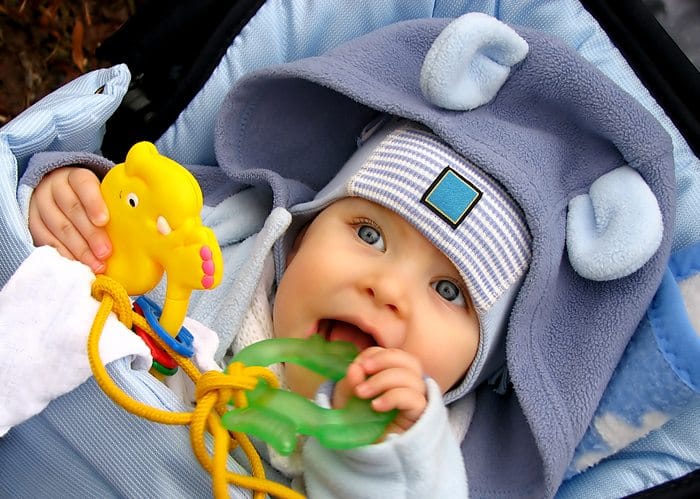What To Expect When Your Child Starts Teething

As a Vancouver kids’ dentist, our team at Must Love Kids understands that new parents a have lot of information they must absorb quickly in order to keep up with their baby’s development.
Between trying to monitor when to switch to solid foods, recording frantic crawls across the living room floor, and deciphering first words, parents can have their hands full.
But because a baby’s development occurs so quickly, some of the less glamorous, but still equally important, parts of that development can get overlooked.
Your child’s oral health development is one area of development that can get easily overlooked, but when a child starts teething means a lot for their overall health and comfort.
What Age Does Teething Begin?
A baby begins teething when their first set of teeth, referred to as primary teeth, begin to emerge through the gums. A baby typically starts teething between six and eight months of age. However, it’s completely normal for teething to start as early as three months or as late as one year. By the time a child turns three, they will have developed all 20 primary teeth.
In most cases, the lower front teeth will form first, followed by the upper front teeth, which will generally start to emerge one to two months later.
Symptoms of Teething
How a baby reacts to teething greatly depends on the individual child. Some babies will act fussier than usual when they begin to teeth. This may be due to some soreness and swelling in the gums that occurs just prior to a tooth emerging. These types of symptoms usually begin three to five days before the tooth appears in the mouth, and then symptoms reduce after the tooth breaks through the skin. Conversely, some children show no signs of being affected by teething.
To help relieve the pressure built up in their gums, some babies will bite on toys or fingers. They may also start refusing to eat or drink because of the discomfort they’re experiencing.
Many babies will start to drool during teething, which can result in a rash developing on their chest, face, or chin.
These types of mild symptoms are nothing to be concerned over. Call Must Love Kids or your pediatrician if your baby’s symptoms become severe or don’t improve.
Helping Your Baby Feel Comfortable
Here are a few tips that will help your baby feel a little more comfortable while teething:
- With a clean finger (or cold teething ring), gently rub your baby’s gums for about two minutes. Many babies find this treatment soothing, although they may fuss at first.
- Give your baby safe objects to chew on, avoid liquid-filled teething rings or any plastic objects that might break.
- Feed your baby cool, soft food like yogurt or applesauce, if your baby is eating solid food.
- Avoid over the counter medications, especially the ones that are rubbed on the gums.
The American Academy of Pediatric Dentistry recommends that parents schedule their child’s first appointment with a dentist when the first tooth appears, or no later than his/her first birthday. Regular check-ups every six months is recommended in order to prevent cavities and other dental problems, and our kids’ dentist at Must Love Kids can tell you when and how often your child should visit based on their personal oral health.
Should you have any other questions about what to expect during teething or when to schedule an appointment, give us a call at Must Love Kids. We’ll be happy to answer any of your questions.